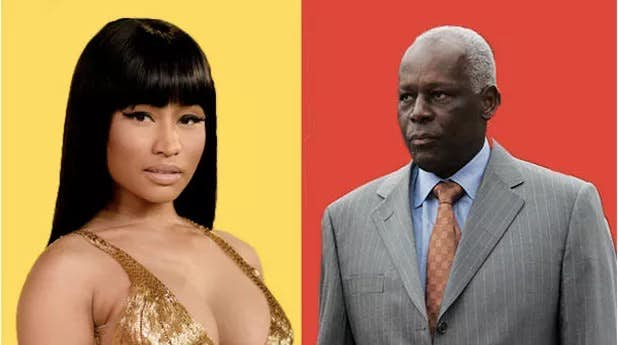HRF president Thor Halvorssen and HRF International Council member George Ayittey in Slate on Nicki Minaj's upcoming performance for Angolan dictator José Eduardo dos Santos.
She is supposed to sing for Angola’s brutal ruler on Saturday. Will she take the high road or a blood diamond paycheck?
On Saturday afternoon the American rapper Nicki Minaj will bring her award-winning talent to a southwest African stage in the Angolan capital of Luanda. It isn’t a world tour stop, but a special engagement at a “Christmas Festival” sponsored by Unitel, a telecommunications company controlled by Angola’s dictatorship.
Two years ago, Mariah Carey was paid $1 million to perform in Angola at another one of the regime’s holiday parties. Since she had promised to never perform for dictators again after singing for Libya’s Qaddafi family, the public wasn’t forgiving the second time around. The result was a global PR scandal that led Carey to sever ties with Jermaine Dupri, the manager who arranged the visit.
Minaj’s music performances are managed by Cortez Bryant and Gee Roberson of the Blueprint Group. According to a local source, Bryant and Roberson will earn somewhere between 10 and 20 percent of Saturday’s $2 million fee. Whereas Minaj will bear the brunt of the criticism, her managers will laugh all the way to the bank.
Jose Eduardo dos Santos has ruled Angola since seizing power in the fall of 1979. A cunning tyrant, dos Santos survived a legacy of colonialism and devastating civil war to consolidate control over the presidency, military, and judicial system, all while crushing independent journalism and civil society. He uses rigged elections to fake democratic credentials, and his suppression of dissent is ruthless. As part of a national wave of arrests his regime has put 17 activists on trial for reading books on nonviolent resistance. Earlier this year, his security officers carried out and covered up a massacre of hundreds of civilians.
For 36 years dos Santos has exploited Angola’s vast natural resource wealth to build an enormous business empire, enriching his family and positioning them at the top of the country’s key industries. From there, they steal what they want from Africa’s second largest oil producer. According to the International Monetary Fund, between 2007 and 2010 “at least $32 billion of oil revenue went missing” from Angola’s federal ledger.
This theft has led to what a recent New Yorker investigation described as “grotesque inequality,” where—in the shadow of palatial estates and exotic car fleets—Angolans have a life expectancy of 52 years. Half live on less than $2 per day, and 60 percent of the population lacks regular access to electricity. State coffers are emptied to satisfy the lives of a few, while the rest of the country suffers in legitimately pre-modern conditions.
Dos Santos is as generous a father as he is brutal a dictator. Today his 42-year-old daughter Isabel dos Santos is Africa’s youngest billionaire, with an estimated net worth of $3.5 billion. Her riches don’t just come from controlling stakes in the oil, banking, construction, and telecom sectors: According to the local anti-corruption organization Maka Angola, she is the largest beneficiary of the country’s deadly trade in blood diamonds. Just this month, Transparency International named Isabel one of the world’s 15 “most symbolic cases of grand corruption.”
Minaj’s payday is all the more jarring given that she and her managers joined the chorus of the Black Lives Matter movement. It appears that when those black lives happen to be in Angola, their lives matter less than a paycheck from a dictator.
Consider Angolan rapper Luaty Beirão. He is currently jailed by the dos Santos regime—accused of “rebellion” for reading a book—and has even gone on a hunger strike to protest his imprisonment. But his suffering and Angola’s broader crackdown on artistic expression has raised no empathy from Minaj and her team.
Beyond her outspoken views on racial injustice in America, Minaj’s commitments to various social justice and education charities inside the United States make her Angola trip especially confounding. Her rank hypocrisy when it comes to caring about justice in one place but not in Angola eliminates any shred of credibility Minaj may have to opine on matters of race or rights in the future.
Beyond Minaj and Mariah Carey, Human Rights Foundation has documented performances and visits from Leo Messi, Jennifer Lopez, Nelly Furtado, Hilary Swank, Kanye West, and Erykah Badu for tyrants in Gabon, Turkmenistan, Chechnya, Kazakhstan, and Swaziland in exchange for seven-figure paychecks. The outcomes have been predictable: PR scandals, the firing of management teams, and, in the case of Messi and Furtado, refunds where the performers end up donating the blood money away to charity. In 2010, Colombian superstar Shakira was invited to perform at the birthday party for Ramzan Kadyrov, the rape-brigade employing thug installed by Vladimir Putin as the puppet ruler of Chechnya. Our organization, HRF, sent her a letter detailing Kadyrov’s crimes, asking her not to go—impressively, Shakira canceled her performance.
Revealing the depth of her ignorance and her hostility to criticism, Minaj has done the opposite, tweeting excitement about the Angola show and warning critics that “every tongue that rises up against me in judgement shall be condemned.”
It’s quite possible that Minaj doesn’t know anything about Angola. But her management team is fully briefed. In some cases, performers like Minaj are manipulated by people willing to do anything for a bigger cut of the action. As of today, Bryant and Roberson have ignored HRF’s requests for comment.
